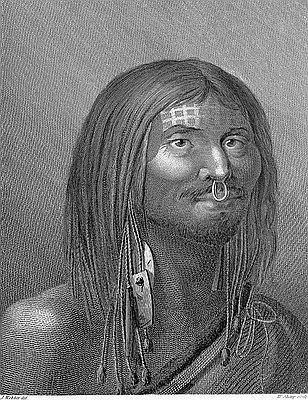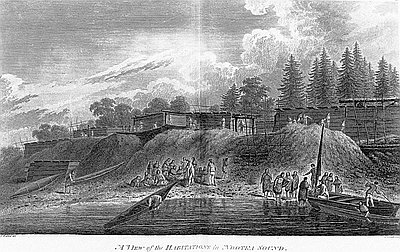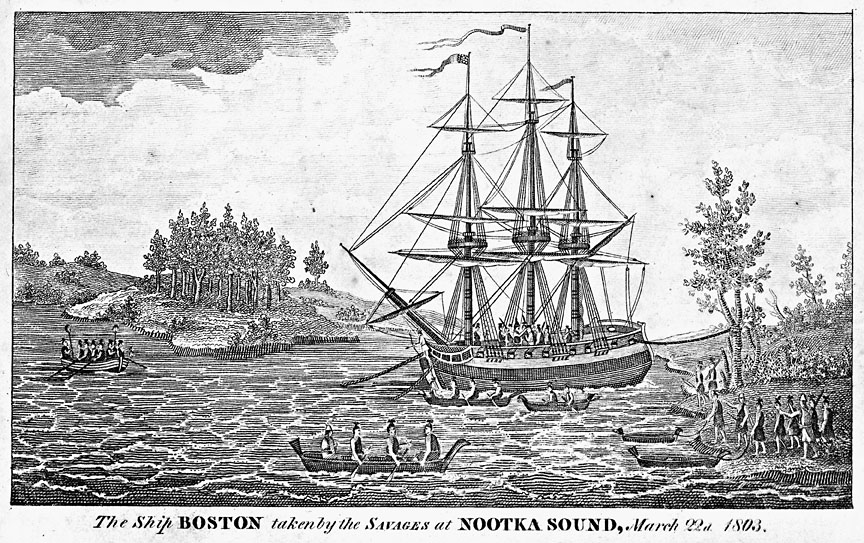- Catalog No. —
- CN 086321
- Date —
- 1816
- Era —
- 1792-1845 (Early Exploration, Fur Trade, Missionaries, and Settlement)
- Themes —
- Environment and Natural Resources, Exploration and Explorers, Native Americans, Trade, Business, Industry, and the Economy
- Credits —
- Oregon Historical Society
- Regions —
- Oregon Country
- Author —
- A Narrative of the Adventures and Sufferings of John R. Jewitt
Under Attack at Nootka Sound, 1803
This engraving is an illustration from the 1816 edition of A Narrative of the Adventures and Sufferings of John R. Jewitt. It is likely based on a drawing by John Jewitt.
On March 22, 1803, Mowachaht Natives from the village of the Yuquot attacked the American trading vessel, the Boston, anchored in Nootka Sound on Vancouver Island. Led by the local leader Maquinna, the Mowachaht warriors killed all but two members of the twenty-six man crew. Maquinna chose to spare the lives of John Rogers Jewitt, the ship’s armorer, and John Thompson, the sail maker. In the narrative of his two-year captivity amongst the Mowachaht, Jewitt explained that the attack on the Boston had “principally arisen from the imprudent conduct of some of the captains and crews of the ships employed in this [fur] trade, in exasperating them by insulting, plundering, and even killing them on slight grounds.” Jewitt’s words aptly describe the dynamics of Native-newcomer relations during the maritime fur trade era, when cultural differences and misunderstandings, as well as arrogance and frustration, sometimes led to violent encounters. The Mowachaht of Yuquot village had endured a number of such encounters for several years. When Captain Salter of the Boston insulted Maquinna by calling him an ungrateful liar, Salter unwittingly challenged Maquinna to take action—both to preserve his own standing in the eyes of his people and to finally avenge the abuses inflicted by previous European and American fur traders and explorers.
During Jewitt’s two-year captivity in Maquinna’s household, the young Englishman managed to keep a journal of his experiences. The narrative based on this journal, written in collaboration with Richard Alsop, also records Jewitt’s observations about local Native groups and his relations with the Mowachaht. Maquinna chose to spare Jewitt’s life because as a blacksmith and armorer, his skills would be useful. Over the ensuing two years, Jewitt showed himself willing to survive by adapting to the Mowachaht way of life. He agreed to take a Native wife, adopted Mowachaht dress, learned the Natives’ language, and tried to maintain positive relations with the villagers. Jewitt’s Christian faith was a great source of comfort. By the summer of 1805, when Jewitt managed to arrange his release and that of John Thompson, he had a developed a complex relationship with Maquinna and his family. Although Jewitt was glad to be released, he later wrote that he “could not avoid experiencing a painful sensation on parting from this savage chief, who had preserved my life, and in general treated me with kindness.”
Further Reading:
Arima, Eugene and John Dewhirst. “Nootkans of Vancouver Island.” In Handbook of North American Indians. Vol. 7. Northwest Coast. Edited by Wayne Suttles. Washington, D.C., 1990..
Pethick, Derek. The Nootka Connection: Europe and Northwest Coast, 1790—1795. Vancouver, B.C., 1980.
Donald, Leland. Aboriginal Slavery on the Northwest Coast of North America. Berkeley, Calif., 1997.
Written by Melinda Jette, © Oregon Historical Society, 2003.
Related Historical Records
-
Man of Nootka Sound
This engraving is from a 1778 portrait by John Webber, the artist who was assigned to accompany James Cook’s third expedition to explore the Pacific. Webber was the …

-
View of the Habitations in Nootka Sound
This engraving represents men from Captain James Cook’s third voyage to the Pacific Ocean meeting with Native Americans on the beach below what is probably Yuquot, the summer …

